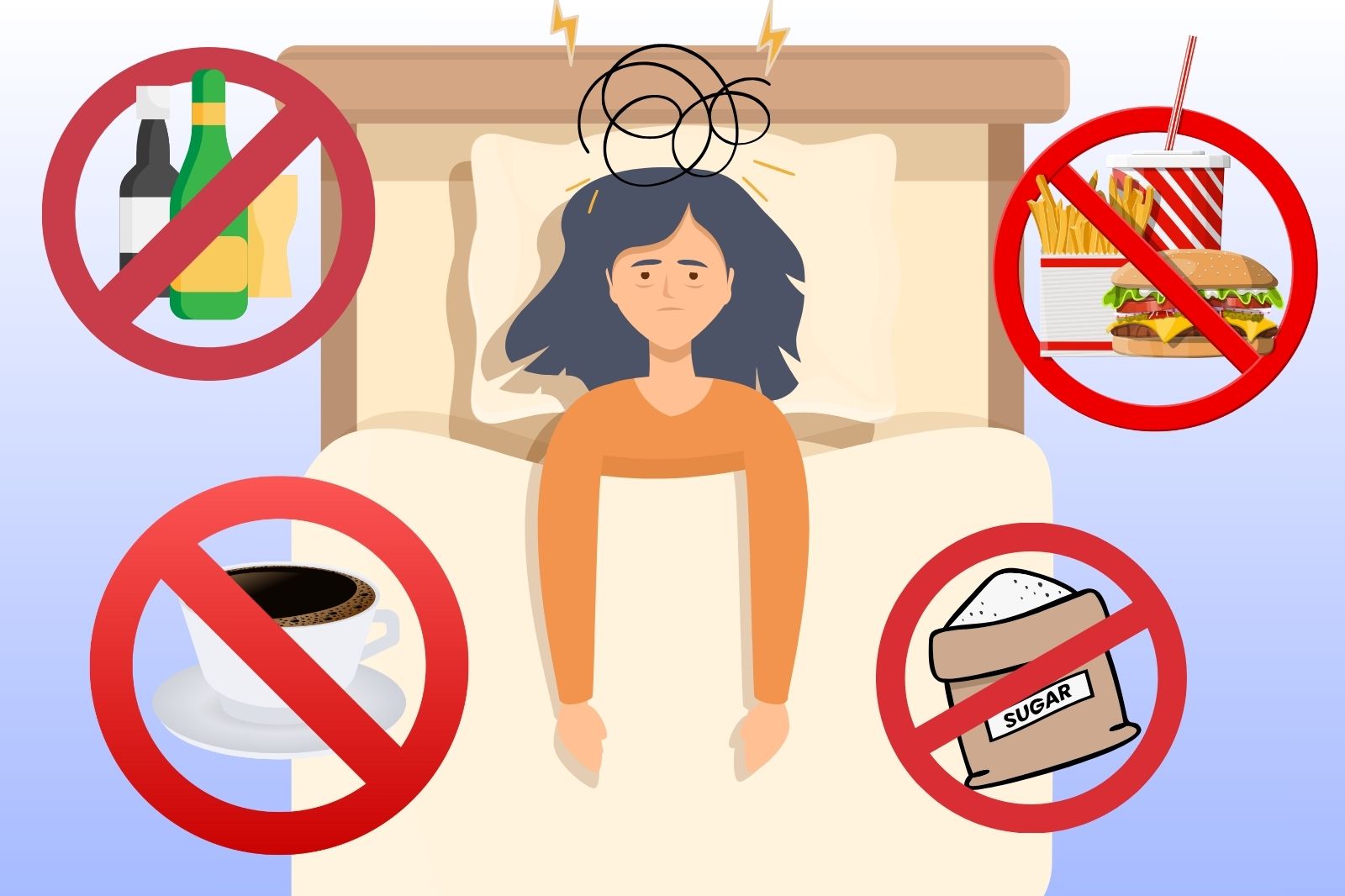The Top Foods to Avoid for Sleep

A good night’s sleep is essential for overall health and well-being, but it gets hard when dealing with adult responsibilities. More often than not, sleep gets skimped on. Besides screen time and other stressors, did you know the food you eat before bed can significantly impact the quality of your sleep? Understanding which foods to avoid before bed can help you enjoy a more restful night. Here’s a look at some of the key foods to avoid and tips for alternatives.
Caffeine
A no-brainer, avoiding coffee before bed. Caffeine is a well-known stimulant found in coffee, tea, chocolate, and many soft drinks. It works by blocking adenosine receptors in the brain, which helps you stay awake and alert. While coffee or chai tea can be beneficial during the day, consuming caffeine too late in the day can interfere with your ability to fall asleep. Caffeine can stay in your system for several hours too and cause abdominal upset. Opt for caffeine-free herbal teas or water in the evening to help your body wind down.
Alcohol
While alcohol may initially make you feel drowsy, it can disrupt your sleep cycle. After the initial sedative effect wears off, alcohol can cause you to frequently wake up. Additionally, alcohol can lead to dehydration and exacerbate snoring or sleep apnea. Try a sleepy mocktail instead made of soda water and tart cherry juice.
Heavy or Fatty Foods
Consuming heavy or fatty foods close to bedtime can cause discomfort and indigestion. Foods high in fat, such as fried items, pizza, or fatty cuts of meat, can delay stomach emptying and lead to acid reflux or heartburn. For better sleep, aim to have your last meal at least two to three hours before bedtime and choose lighter, easily digestible options like vegetables, lean proteins, or whole grains.
Spicy Foods
Spicy foods can increase your metabolism and body temperature, making it harder to wind down before bed. Capsaicin, the compound that gives chili peppers their heat, can also lead to digestive issues, such as heartburn or acid reflux. Try to steer clear of spicy foods in the evening and opt for mild, soothing dishes instead.
Sugary Foods
We all love a little treat but high sugar intake can lead to fluctuations in blood sugar levels. Consuming sugary snacks or desserts before bed can cause spikes in energy and disrupt your ability to fall asleep or stay asleep. Additionally, high sugar consumption is linked to poor sleep quality and increased wakefulness during the night. Opt for snacks with a low glycemic index, such as fruits or nuts, to keep your blood sugar levels stable.
Processed Foods
Processed and packaged foods often contain high levels of sodium, preservatives, and artificial additives, which can interfere with sleep quality. Excess sodium can lead to dehydration and disrupt your sleep. Additionally, artificial additives and preservatives can affect your overall health and well-being. To support better sleep, focus on a diet rich in whole, unprocessed foods instead.
Large Meals
Eating large meals close to bedtime can strain your digestive system and make it difficult to fall asleep. A heavy meal can cause discomfort, indigestion, and even nightmares. To avoid these issues, try to keep your evening meals moderate in size and opt for a light snack if you’re hungry before bed. Foods that are high in tryptophan, such as turkey or yogurt, can help promote relaxation and sleepiness.
Dense High-Protein Foods
While protein is an essential part of a balanced diet, consuming high-protein foods right before bed can be problematic for some people. Proteins can take longer to digest and may lead to discomfort or digestive issues that can interfere with sleep. Instead, opt for a light, balanced snack that includes a combination of protein and carbohydrates, such as a small serving of nuts or a piece of fruit with a bit of cheese.
Too Much Water and Other Fluids
While staying hydrated is important, drinking large amounts of water or other fluids right before bed can lead to frequent trips to the bathroom during the night. Try to limit fluid intake an hour or two before bedtime, so take small sips only, if anything. Ensure you’re adequately hydrated earlier in the day.
Conclusion
Making mindful food choices in the hours leading up to bedtime can significantly improve the quality of your sleep. By avoiding the foods and drinks above, you can create a more conducive environment for restful sleep. Incorporating a balanced diet that supports overall health and well-being will not only enhance your sleep but also contribute to better energy levels and overall quality of life. Remember, the key to a good night’s rest is not just about what you avoid but also about making positive, sleep-friendly choices.
Why Trust Us?
At The Sleeping Institute, we're dedicated to transparency, impartiality, and accuracy in every article we publish. Our reviews are based on comprehensive analysis and firsthand experience. Staying current with the latest advancements in sleep technology, we offer up-to-date, reliable, and unbiased information to help you make informed decisions for a better night's rest. Let us be your trusted guide in the ever-evolving world of sleep technology!